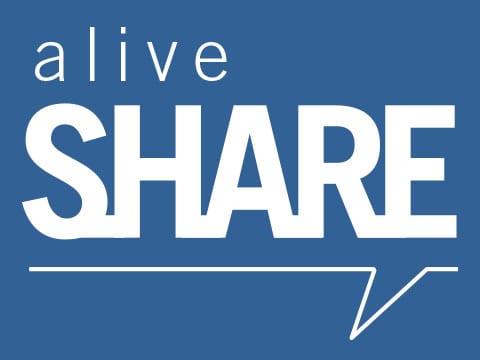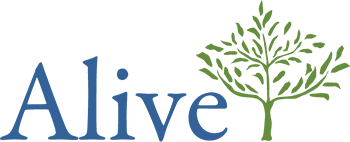Published on September 1, 2017

Alive is well known here in Middle Tennessee; we were the first hospice provider in the Southeast, as you may recall. But our star is on the rise because of some of the innovative things we’re doing within the realm of training and education, and we’re attracting attention on the national stage.
If you read the Wall Street Journal, you may have noticed an article about Alive SHARE – a program we formally launched in June that is already making a positive difference for physicians and RN case managers. Alive SHARE (Supporting Patients And Families Through Honesty, Autonomy, Reflection And Empathy) provides training for health care professionals with difficult end-of-life conversations, something that generally is not part of medical and nursing school curricula.
What that means for patient care: A 2016 survey of primary care and specialist physicians in 50 states found that this lack of training is a barrier to these critical conversations about the end of life. Key findings of the survey, titled “Conversation Stopper: What’s Preventing Physicians from Talking with Patients about End-of-Life and Advance Care Planning?”, conducted by The John A. Hartford Foundation, the California Health Care Foundation and Cambia Health Foundation:
- Less than one-third (29 percent) of physicians have had any formal training on talking with patients and families and the end of life;
- Nearly half (46 percent) of physicians frequently or sometimes feel unsure what to say;
- Almost all (99 percent) of the physicians surveyed believe it is important to talk with their patients about end-of-life care.
Consider this: More than 2.6 million people die in the United States annually, and doctors have significant influence over what happens at the end of life. Patients listen to them. But by and large, these conversations just aren’t happening. Underlining the point: Medicare began reimbursing physicians for advance care planning / end-of-life conversations with patients last January, but a 2017 poll found that “only about 14 percent of doctors who regularly treat patients over 65 have submitted such bills to Medicare,” according to the Chicago Tribune.
At least part of the reason for this, one expert told the Tribune, is that physicians are hesitant to have these vital (and understandably difficult) conversations. And that raises some serious questions about patient care at the end of life:
- What’s at stake for patients when doctors don’t have end-of-life conversations?
- Are patients getting care that reflects their preferences, goals of care, personal values?
- Would end-of-life care be significantly different if doctors help patients think about their options and what they want?
- When these discussions do happen, how productive are they if doctors aren’t comfortable having them?
The time has come for a change, and Alive is creating that change.
The concept, the methodology, the outcome
Alive SHARE is designed for health care providers and others with varying levels of experience, from students who seek to augment their education to practicing physicians and other health care professionals who did not receive training for end-of-life conversations.
The training regimen is built upon adult learning theory, designed and facilitated by experts with decades of health care experience, and supported by medical research.
Physicians who complete Alive SHARE are eligible to receive CME’s through the joint providership of Saint Thomas Health and Alive, and nurses are eligible to receive CE’s through the Tennessee Nurses Association.
How it works: Participants choose either one-on-one training or group training at Alive’s Nashville office or at the location of their choosing, locally or elsewhere in the nation. A facilitator introduces four or more scenarios tailored to the trainee’s (or trainees’) learning objectives, each focusing on a specific skill to practice. Following each scenario, the Alive SHARE facilitator and trainee examine the scenario and discuss what worked well and potential improvements.
The scenarios build on one another to help trainees utilize several key skills they’ve practiced, culminating in a final scenario with a variety of dynamics at play.
We even created a Simulation Lab at our Nashville campus to facilitate the training experience with a mock hospital room and actors playing the roles of a patient and concerned family member. Additionally, an audiovisual system allows participants to review and discuss each scenario – what went well, what could have gone better and how.
Another option: Alive offers product-licensing for organizations wishing to offer Alive SHARE themselves. Alive will conduct a four-day, train-the-trainer intensive for organizations wishing to purchase an Alive SHARE licensing subscription.
Regardless of where Alive SHARE training occurs, the objectives are one and the same: to help participants build skills and confidence through an accelerated learning process, resulting in more productive conversations in the course of real-life medical care that leads to better, more appropriate care for their patients.
What we’re seeing so far
We piloted Alive SHARE for a period of six months from late 2016 to June 2017 with 77 participants experiencing the program we developed with generous funding from The Memorial Foundation in honor of the late Claudia Puryear. Those participants gave us invaluable feedback to help us improve the training as we geared up to offer Alive SHARE to many, many many people.
We are proud to report that 100 percent of those who have experienced Alive SHARE said they would recommend it to others.
And people are talking about what we’re doing here at Alive. The Wall Street Journal’s June 2017 article generated significant social media conversations about the end of life – not only from doctors, but from non-medical adults from around the United States. In July, the chatter continued online after STATNews.com spotlighted Alive SHARE. Both articles generated interest in the program – and inquiries from others who wished to experience it.
Where we go from here
Lack of discussion between patients and health care providers about the end of life is a national problem, and we’re providing a solution. We’re taking Alive SHARE to anyone who wants to build skills, experience and confidence in having these critical conversations.
Alive SHARE has the potential to transform the way we have end-of-life conversations on a national scale. We have a health care system that, by and large, is missing a key component: a bridge to care at the end of life. By changing how we have conversations, we are helping the right patients receive the right care at the right time.
That is in the best interest of every person living today, tomorrow and for years to come.
For more information about Alive SHARE and to schedule a training session, visit AliveHospice.org/AliveSHARE or call 615-346-8336.
Alive SHARE is made possible with generous support from: The Memorial Foundation and The Community Foundation of Middle Tennessee
